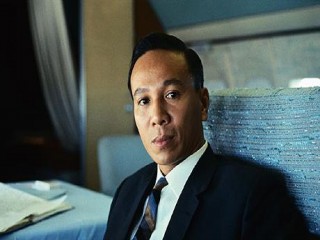
Nguyen Van Thieu biography
Date of birth : 1923-04-05
Date of death : 2001-09-29
Birthplace : Phan Rang, Ninh Thuận Province, French Indochina
Nationality : South Vietnamese
Category : Politics
Last modified : 2012-01-22
Credited as : politician, President of South Vietnam, Vietnamese National Army
Nguyen Van Thieu became president of South Vietnam following the 1967 election in his war-torn country. He led the Saigon government against the Communist enemy during the height of the U.S. escalation of the Vietnam War.
Born on April 5, 1923, in Ninh Tvuan in central Vietnam, Thieu attended the Catholic Pellerin School at Hue and the National Military Academy. A Catholic in a predominantly Buddhist country, he also served in the French-supported Vietnam National Army from 1948 to 1954—fighting against the pro-Communist partisans of Viet Minh leader Ho Chi Minh.
After the termination of the conflict between France and the Viet Minh, Thieu was absorbed into the new independent South Vietnamese army, rising to become commander of the 1st Infantry Division by 1960. During these and the immediately succeeding years, Thieu was a supporter of autocratic president Ngo Dinh Diem (also a Catholic), who was deposed and slain in a military-led coup in 1963. Thieu was at first reluctant to take part in the overthrow, and had to be persuaded to participate.
In the years after the 1963 takeover, Thieu rose steadily in importance. He became deputy premier and minister of defense in 1964. He was appointed chief of state late in 1965 by Nguyen Cao Ky, who became premier when the South Vietnamese generals decided to form their own government following the weak civilian regime of Dr. Phan Huy Quat. Thieu soon proved his political mettle, emerging as the military's candidate in the American-encouraged 1967 elections. The more flamboyant Marshal Ky was forced to accept the soldiers' vice-presidential nomination.
Thieu won, as expected, in the balloting—partly because the country's most popular military figure, Gen. Duong Van Minh, had been disqualified as a candidate on a technicality. But Thieu ended up with a surprisingly modest 35 percent plurality vote (with civilian candidate Truong Dinh Dzu polling 17 percent to finish second).
Following his electoral triumph, President Thieu sought to make his government somewhat more representative than it had been and to unify it politically and organizationally. Originally, only two of 19 Cabinet members were soldiers, and the premier, Tran Van Huong, was a civilian. In 1969, however, Thieu picked Gen. Tran Thien Khiem as premier in a government in which other soldiers, technocrats, and followers of former president Diem predominated. He had chosen to base his government on military rather than popular support.
This decision was further reinforced when Thieu pressed through an election law on June 3, 1971, which would limit the number of presidential candidates. The bill—designed to cut the number of presidential candidates to give the winner a more convincing majority—stipulated that prospective presidential candidates must have their nomination papers endorsed either by 40 deputies or senators or by 100 members of elected provincial councils. Thieu consequently entered the South Vietnamese presidential elections with only one opponent, former general Duong Van Minh, who later withdrew.
The war's unpopularity in the U.S. grew strong, and following the Paris Peace Talks, the U.S. agreed to withdraw its forces in April 1973. Thieu's government survived only two more years. With the North Vietnamese Army encircling Saigon, Thieu officially resigned on April 21, 1975, and fled South Vietnam five days later. He turned the government over to Vice President Tran Van Huong, but Huong resigned seven days later, turning the office over to Duong Van Minh, who was considered acceptable to the North Vietnamese. Minh officially surrendered as North Vietnamese tanks rammed through the gates of the presidential palace on April 30, 1975.
Thieu originally took refuge in Taiwan, but later moved to London, where he lived for several years. He led a very quite life, avoiding the limelight, and granting few interviews. He later moved to the U.S., living in an affluent Boston suburb. Slowly, he began to reemerge, traveling to portions of the world, talking with sympathetic groups in 1989-90. In a November 1990 interview with Time magazine, Thieu stated he was keeping in contact with expatriates, and was organizing groups to support change in Vietnam. He said he no longer wanted a leadership position there ("I am old, too old to take power again"), but wanted to lend his experience to those pushing for reforms. He said he hoped to return again someday to his homeland.
He died in 2001, aged 78, at Beth Israel Deaconess Medical Center in Boston, Massachusetts, after having collapsed from a stroke at his Foxborough home and having been put on a respirator. He was cremated and interred in Boston.















